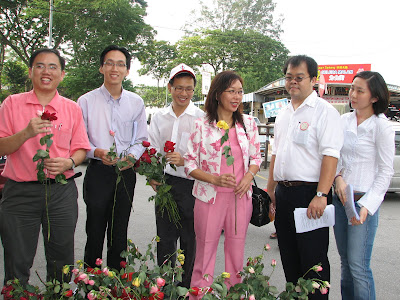- Abolishing Real Property Gains Tax (RPGT): Its Impact on Malaysia's Economy
I've been invited to speak by the Negeri Sembilan Chinese Assembly Hall to share my views on the above. Sharing the stage with me will be Dr Ho Kee Peng, a prominent entrepreneur and academic who will be speaking on other related developments in the Malaysian economy.
Date: 30 March 2007 (Fri)
Time: 8.00 pm
Venue: NS Chinese Assembly Hall, Seremban
Language: Chinese (Mandarin)
- Life & Experiences @ Oxford University
This is the 2nd of the series of higher education talks organised by not-for-profit Descartes Education Counselling Centre. I'll be sharing my personal experience at the university, as well as updating the audience on the latest entry requirements and application process. I'll be sharing the stage with Allen Ng, a Bank Negara scholar who did time at Cambridge University. ;) For more information, see here.
Date: 31st March (Sat)
Time: 4.00 pm
Venue: DECC, 55-1 Jalan SS21/1A, Damasara Utama (Uptown), 47400 Petaling Jaya
- Dinner: Issues with the Malaysian Economy
This is a 50 Years of Nation-Building Dinner event, organised by the DAP Kampung Kolam branch, Penang. I'll be speaking along side many other leaders, including YB Chow Kon Yeow, DAP Penang Chairman, YB Phee Boon Poh, Penang State Assemblyman for Sungai Puyu, YB Teng Chang Khim, Selangor State Assemblyman for Sungai Pinang, YB Violet Yong Wui Wui, Sarawak State Assemblywoman for Pending, YB Nga Kor Ming, Perak State Assemblyman for Pantai Remis as well as Ng Wei Aik, Political Secretary to DAP Secretary-General.
- Date: 1 April 2007 (Sunday)
Time: 7.30 pm
Venue: Wonderland Restaurant, Komtar, Penang.
Language: Chinese (Mandarin)
For those interested in attending, you can buy dinner tickets from Wei Aik @ RM30 each. You can reach him at nweiaik(at)gmail.com. Your contributions and attendance are much welcome. ;)
- Government’s Education Policies: Are they Successful Instruments of National Development?
This Young Malaysians National Unity & Development in Malaysia forum is organised by the Centre for Public Policy Studies and the Bar Council (through its National Young Lawyers' Committee). It is a full-day event, where my session will commence around 10.45 am. The other speakers in my panel include Dr Oh Ei Sun, a lecturer at Help University College and Universiti Malaysia Sabah and my favourite UM academic, Dr Azmi Sharom.
Other topics discussed include:Roundtable details:
- Ethno-Religious Politics in Malaysia: Impact and Implications on Nation Building
- Forging a Young Malaysian Identity towards National Unity
Date: 3rd April 2007
Time: 8.30am - 4.00pm
Venue: Bar Council, Kuala Lumpur
So, that looks like a major round the country tour within a short 2 weeks ;). After that, I'll be busy with the by-elections campaigning in Machap, probably my maiden rally speech there, plus plenty of practice for my Mandarin as well as Malay ;). I'll also be making a trip to Kuching, Sarawak on the 21st April share views and ideas with our DAP leaders and comrades there.
Also, as I've mentioned previously, I'll do my best to start recording these talks so that I can share them here on this site.
So, if you are at any of these places, rememer to say hi! ;)










